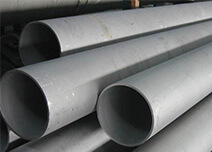- SITEMAP
- CONTACT US
- 8618267732328
News
Credibility ,the lifeblood of enterprise!
- Fittings
- Butt Welding Fittings
- Forged Fittings
- 180 Degree Elbows
- 90 Degree Elbows
- 60 Degree Elbows
- 45 Degree Elbows
- 30 Degree Elbows
- Equal Tee
- Reducing Tee
- Concentric Reducer
- Eccentric Reducer
- Lap Joint Stub End
- Outlets
- Cap
- Bend
- Cross
- Coupling
- Stainless Steel Lateral Tee
- Bellows Expansion Joints
- Flexible Metal Hose
- Non-Standard/Custom Fittings
- Bleed & Flushing Rings
- Types of Flanges
- Anchor Flanges
- Blind Flanges
- Expander Flanges
- High Hub Flanges
- Lap Joint Flanges
- Long Weld Neck Flanges
- Nipoflanges
- Orifice Flanges
- Plate Flanges
- Ring Type Joint Flanges
- Reducing Flanges
- Slip On Flanges
- Socket Weld Flanges
- Spectacle Blind Flanges
- Square Flanges
- Spades & Ring Spacers
- Threaded Flanges
- Welding Neck Flanges
Why do stainless steel pipes rust?
Stainless steel refers to the resistance of air, steam, water and other corrosive medium and weak acid, alkali, salt and other corrosive medium corrosion of steel, also known as stainless acid resistant steel. In practical applications, the corrosion resistance of steel is often referred to as corrosion resistant stainless steel, and the chemical resistance of the medium corrosion of steel called acid resistant steel. Due to the difference in chemical composition of the two, the former is not necessarily resistant to chemical medium corrosion, while the latter are generally non rust. The corrosion resistance of stainless steel depends on the alloy elements contained in the steel. The basic elements of stainless steel, nickel, molybdenum, titanium, niobium, copper, nitrogen, etc., in order to meet the needs of various applications of stainless steel structure and performance requirements. Stainless steel is easy to chloride corrosion, because chromium nickel chloride is collocated elements, elements will be collocated to form stainless steel corrosion exchange assimilation.
Stainless steel pipe rust, may have the following reasons:
1, the use of chloride ions in the environment
There is a wide range of chloride ions, such as salt / sweat / sea / sea breeze / soil, etc.. Stainless steel pipe in the presence of chloride ion environment, corrosion quickly, even more than ordinary low carbon steel. Therefore, the use of stainless steel pipe has the requirements of the environment, but also the need for regular cleaning, remove dust, clean and dry. This will give him a "improper use" The United States is an example: an enterprise solution with a container containing a chlorine ion of the oak, the container has been used for nearly 100 years, the 90s plan of last century replacement, due to insufficient material using modern oak, leakage due to corrosion of stainless steel container for 16 days after the replacement.
2, no solid solution treatment
The alloying elements did not dissolve into the matrix, resulting in low alloy content and poor corrosion resistance.
3, inherent intergranular corrosion
This kind of material without titanium and niobium has the tendency of intergranular corrosion. The addition of titanium and niobium can be reduced to intergranular corrosion. From the point of view of metallography, a thin chromium film is formed on the surface of the stainless steel tube containing chromium, which is separated from the oxygen in the steel from corrosion. In order to maintain the corrosion resistance of stainless steel pipe, steel must contain more than 12% chromium. Used for welding occasion, low carbon content makes precipitation near the weld heat affected zone of carbide minimized, and carbide precipitation may lead to intergranular corrosion of stainless steel pipe in some environments (weldingerosion).
Source: China Stainless Steel Pipe Manufacturer - Yaang Pipe Industry Co., Limited (www.yaang.com)

Tel No:+86-18267732328 / Email:[email protected]
Address:Longwan District, Wenzhou, Zhejiang Province, China.
Copyright Notice © www.yaang.com Yaang Pipe Industry Co., Limited All rights reserved.
Yaang Pipe Industry Co., Ltd. is an international supplier of piping solutions for flange, butt welding fittings, socket welding fittings and threaded fittings. Our products are widely used in different industrial fields, including oil and gas, chemical industry, petrochemical industry, power plant, pulp and paper industry, environmental and water conservancy engineering, engineering projects, etc.





